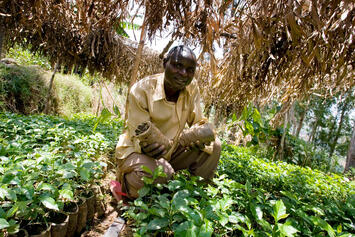
The Covid-19 pandemic has been particularly cruel to the developing world, with Africa, Latin America, and South Asia all epicenters of high fatalities. But something worse may be on the way – this time not from viruses but good intentions, bolstered by often-unrealistic climate projections, which threaten to keep these countries in poverty for the foreseeable future.
Economically strong countries – China, above all – account for most of the world’s greenhouse-gas emissions. But increasingly, western powers, along with the World Bank, investment banks, development funds, and the huge nonprofit sector, are moving to block fossil-fuel projects that could lift large parts of the world out of energy poverty. Emissions and economic progress remain closely linked; in the last two decades, CO2 concentrations have been falling in all wealthy nations, though these reductions were offset by the outsourcing of manufacturing jobs to a resurgent China.
The still-developing countries’ misfortune has been to get to the economic table when the climate change movement has gained unprecedented power in the West, placing new roadblocks in their following the East Asian path of manufacturing-led growth. At the same time, concerns over loss of industrial and other fossil-fuel-related jobs have led to growing calls from the likes of Senate Majority Leader Charles Schumer and the European Commission to tax the carbon content of imports, threatening the anti-poverty strategies of India and other poorer countries while also dimming the prospects of struggling middleweights like Russia, Turkey, and Ukraine.
These countries are not likely to agree with U.S. climate representative John Kerry’s notion that “no one is being asked for a sacrifice.” It’s all about which populations get hit hardest under green-ification. We can see previews already in places like California and in Germany, where green energy shortfalls produce higher prices, rising energy poverty, blackouts – and a growing dependency on less-green places, like the Intermountain West or Russia, for energy.
Of course, such comparatively rich places are far better equipped to absorb soaring energy bills. If decarbonizing means the end of growth in the West, including restrictions on air travel, what will it mean for countries that are already poor, energy short, and possessing little in the way of savings? The Rockefeller Foundation estimates that more than half of Sub-Saharan Africa still lives in energy poverty, with deforestation making up the majority of its energy-related needs. The practice of indoor cooking on open fire and stoves alone contributes to almost half of all childhood-pneumonia related deaths worldwide.
Africa needs energy: the continent is set to make up almost 40% of the world’s population by the end of this century, and it is urbanizing at a rapid rate. In some senses, Africa’s problem is not its carbon footprint, but lack of one; the continent accounts for only 3% of the world’s carbon emissions. In Africa’s two largest economies, South Africa and Nigeria, the youth unemployment rate pre-Covid-19 approached 50%, five times that of the U.S. and three times that of the EU.
These social ills can be traced in part to lack of reliable energy and water for developmental needs. South Africa has since 2008 experienced an energy shortfall and simultaneously a water crisis. In 2021, Nigeria experienced a total grid collapse, and blackouts in the country are routine. Comparable situations exist in Iran, Pakistan, and Bangladesh.
There are also massive political risks. Africa’s young population is frustrated and unemployed, and riots over a rise in energy prices have occurred in South Africa, Nigeria, and Senegal. Comparable events occurred in 2019 in Iran, when protestors demonstrated against increasing fuel prices, as well as in Lebanon and Ecuador in 2021 The pandemic has made these places even more unstable, but long-term energy deficits could make such disorder commonplace.
Read the rest of this piece at Real Clear Energy.
Joel Kotkin is the author of The Coming of Neo-Feudalism: A Warning to the Global Middle Class. He is the Presidential Fellow in Urban Futures at Chapman University and Executive Director for Urban Reform Institute. Learn more at joelkotkin.com and follow him on Twitter @joelkotkin.
Hügo Krüger is a Structural Engineer with working experience in the Nuclear, Concrete and Oil and Gas Industry. He was born in Pretoria South Africa and moved to France in 2015. He holds a Bachelors Degree in Civil Engineering from the University of Pretoria and a Masters degree in Nuclear Structures from the École spéciale des travaux publics, du bâtiment et de l'industrie (ESTP Paris). He frequently contributes to the South African English blog Rational Standard and the Afrikaans Newspaper Rapport. He fluently speaks French, Germany, English and Afrikaans. His interests include politics, economics, public policy, history, languages, Krav Maga and Structural Engineering.
Photo credit: Kate Holt via Flickr under CC 2.0 License.












